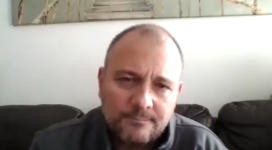Exactly one year since his inauguration as the head of the 77-million member Church of England, the Archbishop Rowan William explained the pain and pressures his position entailed following the controversial consecration of an openly gay man as bishop in America, Feb. 27, 2004.
"I think that the level of expectation on any archbishop is very, very high,” said the Archbishop of Canterbury. "The expectation within Britain, both in the church and in the wider culture - because, as somebody put it, you have got to try to be a sort of vicar for the whole country - and then the expectation in the Anglican Communion, holding a global family of churches together, in some way giving leadership there... so there are huge expectations.”
Following the consecration of the openly gay Gene Robinson in the New Hampshire diocese of the communion, many expected that the Archbishop would bring an end to the divisive affair. However, despite the desperate pleas of conservative Anglicans worldwide for Canterbury to disapprove the consecration, Williams remained silent, objecting only the “tragic divisions” that trailed the event.
By the time the Archbishop of Canterbury’s annual Commission took place early February, thirteen of thirty-nine primates to the worldwide Anglican Communion refused to recognize Robinson’s consecration.
‘If his consecration proceeds, we recognize that we have reached a crucial and critical point in the life of the Anglican Communion and we have had to conclude that the future of the Communion itself will be put in jeopardy. In this case, the ministry of this one bishop will not be recognized by most of the Anglican world, and many provinces are likely to consider themselves to be out of Communion with the Episcopal Church (USA),” the Bishops stated.
In this, as well as several preceding statements, the bishops called upon Canterbury to break his silence of approval, and join in the struggle to reveal the truth of the Communion.
“We ask you to join in our repentance for failing to be sufficiently forthright in adequately addressing this issue in the past, and we invite you to stand with us in a renewed struggle to uphold the received truth found in Jesus and His word,” the statement read.
Canterbury, however, avoided the proposal to invalidate the consecration. Instead, he said he would consider recognizing the network of dissenting parishes within the States who refused to accept Robinson as bishop.
Several hundred individual parishes within the Episcopal Church (American extension of the Anglican church) already formed a “Network of Anglican Communion Dioceses and Parishes” apart from Canterbury’s approval.
Furthermore, several denominations outside the Anglican Church scorned the liberal theologies of the Communion. Even the pope John Paul II suggested the consecration made it difficult for ecumenical talks between the two churches.
In lieu of such events, Canterbury rightfully commented that his first year in post “certainly” placed “very very high” pressures on him.
"It was a very difficult period trying to listen to what I thought the church overall, worldwide as well as in England, was wanting on this,” said Canterbury. "What it focused for me, most painfully, in a way, is what it means to try and hold and articulate what the church overall is thinking and wanting.”
According to Williams, the General Synod, the representing body of the Communion, seems to still remain liberal.
"I think that the Church of England's position, whatever was said after the Synod, remains pretty much where it was. What changed, I think this is important, is the tone of the debate. I sensed less anger and anxiety in the debate and wherever the church finds itself, I think that has to be a good thing,” said Williams.
In terms of blessings to gay couples, the Synod did not open the door “at all.”
"What it did simply was to recognise the range of theological thinking there is in the discussion at the moment and try to put it over in an accessible form,” Williams said.
In terms of continuing ecumenical talks with the pope, Williams remained hopeful.
"I don't think the Pope has given up. I don't think anyone in Rome has given up in that sense. Of course, what you are faced with is the honest acknowledgement of serious problems - there is no denying that. But no sense of the door closing, not at all."







